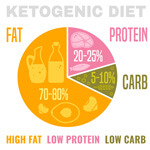When we think of a ketogenic diet, we typically see it as a means of weight loss and combatting obesity. After all, inducing ketosis is a proven method of ridding ourselves of excess pounds safely and without having to suffer the rigors of most ineffective fad diets.
In turn, this helps establish what is the ultimate goal of any weight loss eating program, which is to establish healthy, long-term eating habits that keep the weight off permanently.
However, this doesn’t mean that you need to be overweight to take advantage of the many benefits of this unique dietary approach since its merits go beyond mere weight loss.
But what are these advantages, and how exactly does keto work? Is it a good diet for athletes, or should they avoid it in favor of more carbohydrates?
Let’s find out!
What is the Keto Diet?

However, when carbohydrates are limited in favor of a diet rich in fats and proteins, your body has no choice but to burn what is then the most readily available fuel: fat.
The Health Benefits of Ketosis
When it comes to chronic diseases such as type II diabetes, cardiovascular disease and many types of cancer, carbohydrates are often a large contributor. Naturally, this means that eliminating or lowering your carb intake can help lower your risk for these and other conditions.

Not only can this lower your blood sugar and reduce inflammation, it can also help you think more clearly. This is because your brain is made up of around 60% fatty acids, particularly omega 3’s. This means that you are providing your brain with its most essential nutrients so it can function at its best. (1)
Endurance athletes can also take advantage of the “bonk-proofing” which ketosis provides. Simply put, this means that rather than relying on the constant consumption of sugary gels, sports drinks and other simple carbohydrates for energy, body fat can be used for what it was meant to be used for: providing steady, unwavering energy throughout exercise—even for multiple-hour endurance events.
And, by unwavering, we mean eliminating the ups-and-down energy spike-and-declines of sugar consumption.

This is similar to what happens when your body is used to burning glucose from simple sugars and runs out. Even though your body has plenty of fat calories on hand to continue fueling, it still needs to “switch tanks” from the fuel source it has become accustomed to, which takes time.
Unfortunately, during this switchover time you are left with a miserable condition of little energy which is known of in endurance circles as a “bonk.” (2)
However, for athletes participating in high-intensity workouts, increasing the intake of complex carbohydrates may be necessary to maintain performance. This includes sprinters, and other athletes which require short, intense bursts of energy which studies show may benefit more from carbohydrate energy than their endurance brethren. (3)
Bonk-Proofing Your Diet
By switching to a diet which eliminates all but around 5-10% of your daily calories from carbohydrates while increasing your fat consumption to around 75% of your daily calories and protein to around 10-15%, you can successfully induce the ketogenic process. (4)
While there are more intricacies to the keto diet than this, it is nonetheless a great way to not only maintain a healthy weight, but feel better, think more clearly, lower your risk for many chronic diseases and possibly even become a better athlete.
References:
- https://www.ncbi.nlm.nih.gov/pubmed/20329590
- https://trainright.com/should-endurance-athletes-go-keto-ketosis-ketogenic-diets-for-endurance-athletes/
- https://www.healthline.com/health-news/keto-diet-may-hurt-your-athletic-performance#1
- https://www.ncbi.nlm.nih.gov/books/NBK499830/




